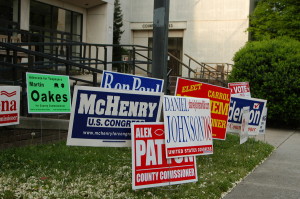 Earlier this week, the United States Supreme Court ruled that the First Amendment prohibits the government from demoting an employee because it incorrectly believed the employee had engaged in Constitutionally-protected political speech.
Earlier this week, the United States Supreme Court ruled that the First Amendment prohibits the government from demoting an employee because it incorrectly believed the employee had engaged in Constitutionally-protected political speech.
The case involves Jeffrey Heffernan, a police officer who worked for the City of Paterson, New Jersey. In 2005, Lawrence Spagnola was running for mayor against incumbent Mayor Jose Torres. Mayor Torres had appointed the Patterson Police Chief, James Wittig, tore his position.
At the request of his mother, Mr. Heffernan picked up a large sign supporting Mr. Spagnola for mayor that his mother wanted to put on her front lawn. Other members of the Paterson Police Department saw Mr. Heffernan holding the sign while he was talking to members of Mr. Spagnola’s campaign staff.
The very next day, the defendants demoted Mr. Heffernan from detective to patrol officer and assigned him to a less desirable “walking post.” Mr. Heffernan alleges they did so to punish him because they believed he was supporting Mr. Spagnola’s campaign. However, Mr. Heffernan did not have any actual involvement in Mr. Spagnola’s campaign and was merely helping his mother.
Mr. Heffernan filed a lawsuit against Paterson, Mayor Torres, Chief Wittig and Paterson’s Police Director, Michael Walker. He alleges the defendants demoted him based on their mistaken belief that he had engaged in political speech, in violation of a civil rights statute, 42 U.S.C. § 1983.
The United States District of Court for the District of New Jersey dismissed Mr. Heffernan’s case on the basis that he had not actually engaged in any Constitutionally-protected conduct. On appeal, the Third Circuit Court of Appeals affirmed that dismissal.
However, in Heffernan v. City of Paterson, New Jersey, the United States Supreme Court reversed. The Court recognized that the First Amendment generally prohibits the government from firing or demoting an employee because he engaged in protected political activity, such as supporting a particular political candidate. It also noted that in a previous case, Waters v. Churchill, it ruled that an employer does not violate the First Amendment if it fires an employee who actually engaged in First Amended-protected speech because the employer mistakenly believed the employee had merely discussed personal matters, which are not protected by the First Amendment.
In Heffernan, the Court ruled that the First Amendment prohibits employers from retaliating against an employee because it wants to stop him from engaging in First Amendment-protected political activity “even if, as here, the employer makes a factual mistake about the employee’s behavior.”
The Court explained that if it had ruled to the contrary, the result would discourage Mr. Heffernan’s peers from engaging in actual First Amendment-protected activities, out of fear of retaliation. As the Court put it, that would have told “others that they engage in protected activity at their peril.”
The Court also noted that typically it will be more difficult to prove an employer fired an employee because it incorrectly believed he engaged in a protected activity. Unlike a typical case, in which the employee can prove he is protected by the First Amendment merely by describing his own conduct, an employee claiming the employer mistakenly believed he engaged in a protected activity will have to prove what was in the employer’s mind.
Finally, the Court noted that the defendants claim they fired Mr. Heffernan based on a policy which prohibits Paterson police officers from involvement in any political campaign. It indicated that such a neutral policy could be lawful. Accordingly, it remanded the case to the Third Circuit to determine whether Paterson actually has such a policy, whether Paterson actually followed such a policy when it fired Mr. Heffernan and whether that policy complies with the First Amendment.
 New Jersey Employment Lawyer Blog
New Jersey Employment Lawyer Blog

